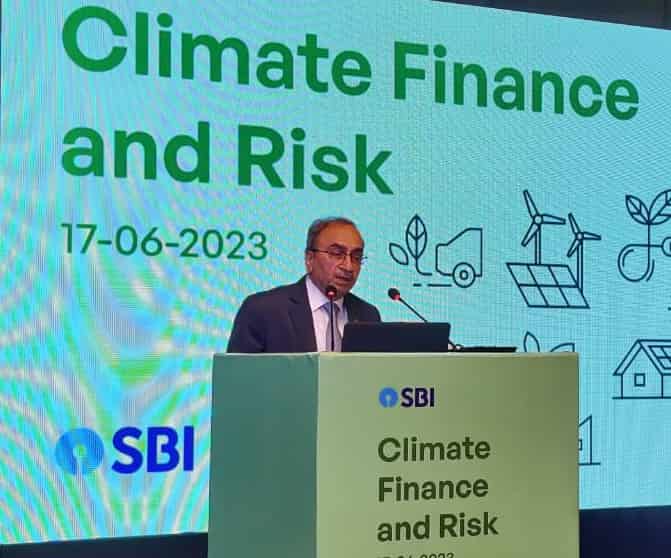New Delh : The State Bank of India, under the aegis of the Department of Financial Services (DFS), hosted a seminar on ‘Climate Finance and Risk’ in New Delhi, attended by leading public and private sector banks, NABARD, NaBFID, SIDBI, RBI, and policymakers, including top functionaries from the Ministry of Finance, Ministry of Environment, Forest, Climate Change, the Reserve Bank of India, and the World Bank.
India ranks 7th among the world’s most affected by climate change, yet a relatively small share (~7%) of climate capital flows into India. The workshop was part of an industry-wide effort to delve into the complexities of climate finance, examining the opportunities and challenges it presents, and finding practical and impactful solutions to climate change.
Speaking at the event, SBI Chairman Shri. Dinesh Khara said, “There is a need to mobilize domestic and international flows from retail as well as institutional investors to meet the green finance needs, and robust climate-focused frameworks backed by central regulations.”
Speakers including Ms. Leena Nandan (Secretary, MoEFCC), Dr. Vivek Joshi (Secretary, DFS), Mr. Saurav Sinha (ED, RBI), Dr. M P Tangirala (Additional Secretary, DFS), and Ms. Rajasree Ray (Economic Advisor, MoEFCC) among others enlightened the participants with importance of climate finance and steps initiated by the government and regulators to mobilize capital towards a green economy.
Ms. Leena Nandan, Secretary, MoEFCC, requested “all stakeholders to collectively come together and adopt a climate-conscious lifestyle to mitigate further aggravating the climate challenge. She additionally highlighted the fact that India has been at the forefront of tackling climate change and has outperformed on its targets around developing green energy capacity.”
Dr. Vivek Joshi, Secretary, DFS, emphasized “the steps taken by India to address the climate change issue and urged banks to collaborate and create policies for mobilizing capital towards mitigation and adaptation finance. He also highlighted the fact that the financial sector is well positioned to incite a behavioral change in corporates and contribute towards building a sustainable society.”
Mr. Rajat Gupta, Senior Partner, McKinsey & Company, added, “With over three-fourths of the India of 2070 yet to be built, the time is ripe for industries to focus not on ‘transition finance’ but on ‘growth finance’ as well as the urgency to act in this decade to build capabilities for the future.”
Key observations at the workshop, organized in collaboration with McKinsey & Company, included the gap in climate finance in India, avenues for mobilizing private capital in emerging markets towards climate-friendly initiatives, the importance of fostering green investments and accelerating the transition to a low-carbon economy.
Key themes discussed at the seminar to scale up green financing in India:
-
- Role of public – private institutions and mechanisms to debottleneck capital flow towards green projects
- Need for a prudent regulatory framework to accelerate green financing
- Role of financial institutions in building internal capabilities to tap into emerging transition finance opportunities
- Role of banks and government in building a strong liability franchisee to mobilise green finance at scale










